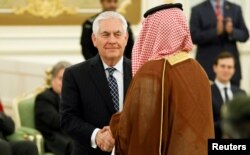U.S. Secretary of State Rex Tillerson is heading to the Middle East on Friday, attending a landmark meeting between the governments of Saudi Arabia and Iraq, and exploring ways of improving relations between the two countries.
The inaugural Coordination Council meeting comes amid a warming of relations between Riyadh and Baghdad. The gathering is seen as part of U.S. efforts to reduce Iran’s increasing influence in Iraq by encouraging Baghdad to align more closely with Riyadh.
"Iran is always a huge concern of ours, not just in Iraq, but throughout the region," said State Department spokesperson Heather Nauert during a briefing Thursday.
She added that the U.S. welcomes the improvement of relations between Iraq and Saudi Arabia, citing an example of how the reopening of the border crossing facilitates commerce between the two nations.
The meeting will be held in the Saudi capital of Riyadh four months after the two countries signed an agreement to establish a council to improve relations between the neighboring countries in an attempt to counter Iran's broad influence in the region.
While in Riyadh, Tillerson will also "meet with various Saudi leaders to discuss the conflict in Yemen, the ongoing Gulf dispute, Iran, and a number of other important and regional and bilateral issues," according to the State Department.
Tillerson's visit to Riyadh will be one of several to countries in the Persian Gulf region and South Asia from October 20-27.
Tillerson will then meet with Qatar leaders and U.S. military officials in the capital of Doha to discuss "joint counterterrorism efforts" and "other regional and bilateral issues," before visiting India, Pakistan and Switzerland.
South Asia
After the Middle East, Tillerson heads to South Asia, which marks his first visit there as the top U.S. diplomat. Expanding cooperation on counterterrorism and strengthening economic ties are said to be high on the agenda.
He will meet Pakistani leaders in Islamabad, and senior Indian officials in New Delhi to discuss continued bilateral cooperation, strategic partnerships and regional security issues.
In Pakistan, Tillerson will discuss joint efforts to fight terrorist groups that threaten regional peace and stability and how Pakistan can support the U.S. effort to "reach a peaceful solution in Afghanistan," the State Department's Nauert said.
The U.S. said its relations with India do not come at the expense of Pakistan and vice versa. A senior official said Tillerson's trip to the region is to implement and reaffirm the administration's new "comprehensive strategy" toward South Asia.
On Wednesday, Tillerson said the U.S. would turn to "partners" in India and Pakistan to ensure greater stability in Afghanistan and throughout the region.
"We expect Pakistan to take decisive action against terrorist groups based within their own borders that threaten their own people and the broader region," said Tillerson, adding Pakistan can further stability and peace for itself and its neighbors, and improve Islamabad's international standing by doing so.
While the top U.S. diplomat was "intensely involved" in the recent release of American citizen Caitlan Coleman and her family, Tillerson's inaugural trip to Pakistan "is not the consequence of that," a senior State Department official said.
Coleman, her Canadian husband, Joshua Boyle, and their three young children were freed and returned to Canada last week, after being held for five years as captives by the Taliban-linked Haqqani network.
In Geneva, Tillerson will discuss "a number of the current global humanitarian crises," including the Rohingya crisis, when he meets with officials from the United Nations High Commissioner for Refugees, the International Organization for Migration and the International Committee of the Red Cross.
The State Department did not disclose the specific dates Tillerson will visit the countries that are included in the announcement.





